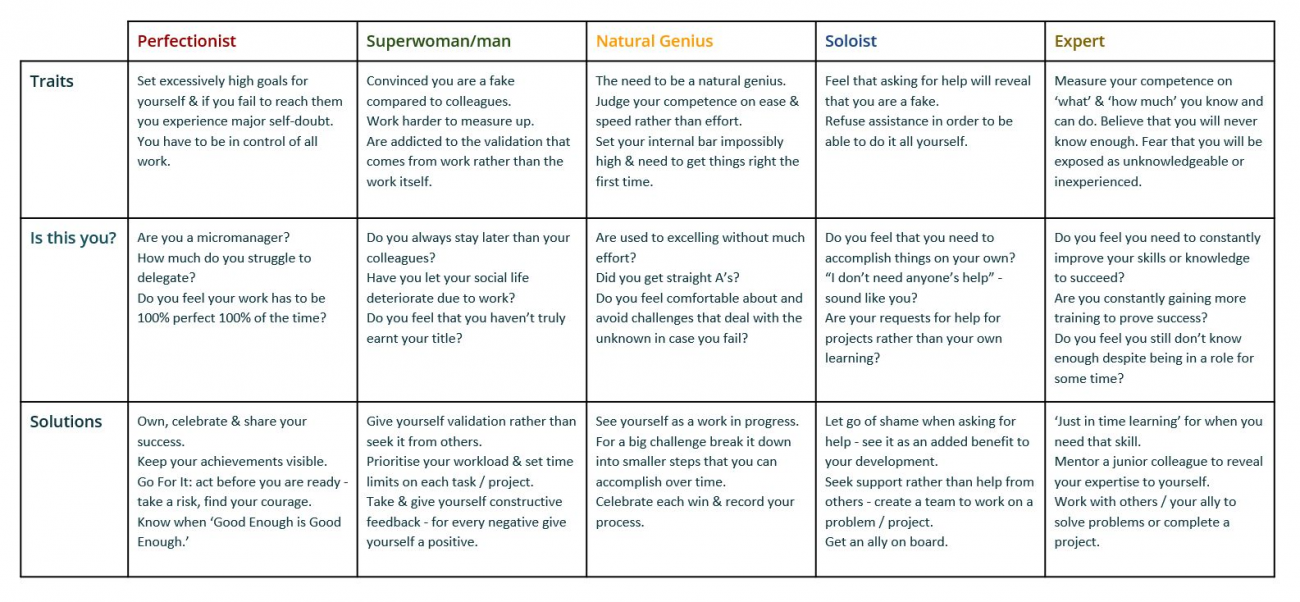
- BLOG
- Guest Blog
Solving Imposter Syndrome
This is a guest blog, written by one of our partners Kate Bishop. Kate is a career and confidence strategist and coach who delivers workshops and talks for us on a range of topics. Most recently, she delivered a session on Imposter Syndrome and it was so popular we decided to ask Kate to write an article for us on this fascinating topic. Huge thanks to Kate for doing so!
SOLVING IMPOSTER SYNDROME
What is Imposter Syndrome?
Excellent question - and I would say that most people have heard of Imposter Syndrome or Phenomenon as it was once called, however, not many people recognise it within themselves and I’ve even had one person shout me down whilst I was giving a presentation on Imposter Syndrome that it is not a ‘real thing’. For anyone else out there who suffers from Imposter Syndrome, especially when it comes to public speaking, then you are absolutely right - it was a horrible feeling and for a moment I wanted the ground to open up and swallow me whole. But, you can’t argue against science and facts so let’s start with them and then have a delve into this devil of a very real thing.
70% of people will experience Imposter Syndrome at some point in their career - that is a LOT of our workforce! Add to this that 85% of adults feel incompetant at work - not just unsure - incompetant! It can affect anyone - men and women from all cultures and backgrounds, however, it is currently seen to be most prevalent in women from ethinic minorities who are in an elevated career or academic position. When you type the words Imposter Syndrome into Google over 4 million results come up.
So, it is a ‘thing’. A very real thing. But what is it? Well let’s take a look at what it is not; Imposter Syndrome is not a medical condition and it is not a mental health diagnosis, however, it can lead to poor mental health such as anxiety, stress and depression. I went through this bitter cycle in my last career and it was incredibly debilitating. Imposter Syndrome is classified as a psychological pattern or collection of feelings of inadequacy that continue to persist in a person’s mind despite evidence of their success. It regularly affects those who are high achievers and who seem to be at the top of their game and can be identified through chronic self-doubt or having a sense of fraudulence. Ever think that your boss will “find me out”? Or perhaps you put all of your success down to luck?
If so - then you might be dealing with a bit of Imposter Syndrome.
In fact, as we have seen, it is inaccurate to say ‘syndrome’ at all as it really is the norm for nearly all of us to feel and experience this at some point in our lives.
Now Imposter Syndrome is fairly new to us all as it was first introduced in 1978 by Dr Pauline Clance & Dr Suzanne Imes in their paper "The Impostor Phenomenon in High Achieving Women: Dynamics and Therapeutic Intervention". They originally called it imposter phenomenon - a term Dr Clance regretted later on as it was to become so normal so not a phenomenon at all. Initially, Dr Clance and Dr Imes only studied high achieving women as both felt like imposters and when their 150 female participants confirmed their suspicions it was thought to only affect women. Clance and Imes believed that their beliefs were a result of: gender stereotypes, early family dynamics, culture, and a way to explain their successes. Beliefs such as thinking that their success was a result of luck, whilst others simply believed that their peers and superiors overestimated their intelligence and abilities.
Clance and Imes also determined that the women who experienced impostor phenomenon showcased symptoms related to depression, generalized anxiety, and low self-confidence. It was not until 1985 that Dr Clance created the Clance Impostor Phenomenon Scale (CIP) - a set of questions that would determine whether or not someone has Imposter Syndrome.
Now seen to be most prevalent in minority groups who may feel that they may have much more to prove to be accepted, so the risk and fear of failure is higher. We can see this is some very famous faces such as Michelle Obama, Serena Williams and Maya Angelou but also in the classic ‘confident’ types (white, men) - people such as Tom Hanks, Neil Armstrong and Einstein - yes Einstein!!!
The CIP was developed to help people determine whether or not they have IP characteristics and, if so, to what extent they are suffering. After taking the CIP, add together the numbers of the responses to each statement and if your total score is :
- 40 or less, you have few Impostor Syndrome characteristics; happy days & no need to worry
- between 41 and 60, you have moderate IS experiences; again no biggie, however, you may want to address a few of the statements which touched a chord
- between 61 and 80 it means you frequently have Impostor feelings
- higher than 80 means you have often intense IS experiences.
The higher the score, the more frequently and seriously the Impostor Phenomenon interferes in a person’s life.
Another way to determine if someone has Imposter Syndrome is to see if they have any of the 6 key areas of it:
- The impostor cycle
- The need to be special or the best
- Characteristics of superman/superwoman
- Fear of failure
- Denial of ability and discounting praise
- Feeling fear and guilt about success
If someone has just 2 out of these 6 then they are regarded as suffering from Imposter Syndrome.
To really understand the manifestation of the Imposter Syndrome experience we can use the Imposter Cycle as seen below:

Let’s take an example - you are asked to give a talk on a piece of work that was successful. Some of us will spend every waking hour researching, planning and preparing for this and when the talk goes well we’ll receive praise from our colleagues, our manager - maybe even those higher up. However, instead of taking their praise and appreciation on board we will put it down to the work that was done, rather than our own skills as a public speaker, or knowledge in the subject. We may convince ourselves that if we had not sat up to 3am every morning for the last few months the talk would have been a disaster.
Or perhaps we will procrastinate over our preparation, or do the bare minimum. Yet again, we give a superb talk and receive praise however, rather than acknowledging expertise in that area we will put it all down to luck.
Imposter Syndrome Types
We can go even deeper into Imposter Syndrome and identity which ‘type’ we most likely resemble. This is key to helping overcome that imposterism so take a look at the below chart and see which one you most closely identify with:

Causes of Imposter Syndrome
A question I often get asked is “Why do some of us have Imposter Syndrome and some of us don’t?” Now, as we have seen 85% of us will feel very unsure of our own ability at work at some point in our careers, I have a sneaking suspicion that figure is a little low and perhaps every single person at some point in their lives feels like an imposter.
So really the question should be - why does it affect some of us so much more than others? To understand that let’s take a look at some of the common causes of Imposter Syndrome;
- The ‘labels’ we were given as children: “The Smart one” “The Talented one” “The Responsible one” “The Good one” “The favourite” which we feel we have to still live up to.
- Or perhaps our school grades were never good enough and we constantly had to work hard to meet those high expectations leading us to now constantly proving to ourselves our self worth
- Maybe we were outshone by a sibling and still have that ‘need to be seen’ and noticed to strive harder and harder to receive validation
- If we received constant criticism then it is likely imposter syndrome has set in, potentially along with anxiety and low self-esteem.
- Imposter Syndrome can also be a response to a childhood trauma and if this has affected you please do seek the appropriate counselling
Minimising Imposter Syndrome
The other question I am always asked is “how can I get rid of Imposter Syndrome?” And I wish I had the answer to that one - sorry folks - there is no quick or fail safe ‘cure’ or way to banish it. We can, however, work on minimising it and even using it to help us.
- Firstly - recognise those thoughts and feelings when they arise and ask yourself what is actually a fact and what is merely a belief - extract the self doubt
- Reframe your negatives thoughts into positive statements
- Question your thoughts & beliefs about yourself: Does that thought help or hinder me?
- Talk to others either through confidence coaching, group therapy or psychotherapy
- Creating your own positive affirmations and either saying them every day or having them on post it notes around your house really helps. My favourite at the moment is “I can, I will, end of story”
- Perhaps you prefer visualisations - if so then create a mood board or find / draw an image that will help you when those imposter thoughts flare up.
- Record all positive feedback - whether this be from colleagues, your manager, your clients - any praise you receive save it, put it in a spreadsheet, print it out - just keep reading it to remind yourself how valued you are.
- Write down your achievements and what you are successful at - and ask yourself what led to that success - give each reason a percentage score as to how much it may have contributed to your success - this stops us putting it all down to luck and reveals how much is in our control
- Help others who may be suffering too - you can share your trials and wins together as well as support each other in tough times
- Stop comparing yourself with others - especially on social media. As much as I love looking at pictures of cute dogs I often delete Instagram when I find myself in a comparison spiral.
- Remembering that not everyone is 100% confident 100% of the time - if we were we would be robots.
- Use Imposter Syndrome to drive you by reminding yourself that those with it are constantly striving to do better, be better, seek more opportunities - this can only be a good thing so embrace this imposter drive and use it to fire you rather than paralyze you.
